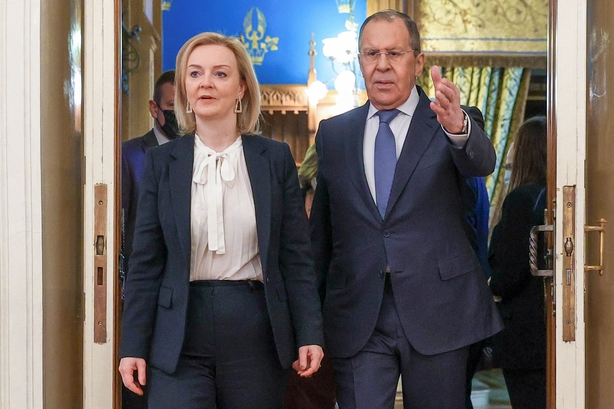NATO's secretary general has warned of a "dangerous moment" for Europe as Russia builds up troops near Ukraine and holds joint military drills in Belarus, but reiterated an offer of talks with Moscow.
Jens Stoltenberg, speaking alongside British Prime Minister Boris Johnson, said he had sent a letter to Russian Foreign Minister Sergei Lavrov offering to discuss more transparency around exercises, as well as nuclear arms control.
"This is a dangerous moment for European security," Mr Stoltenberg told a news conference with Mr Johnson. "The number of Russian forces is going up. The warning time for a possible attack is going down."
"NATO is not a threat to Russia, but we must be prepared for the worst while remaining strongly committed to finding apolitical solution," Mr Stoltenberg said.
He said Russia must choose between a diplomatic solution to the crisis over Ukraine or face economic sanctions from the West and an increased military presence of NATO forces in the alliance's eastern countries.
"Russia has a choice: they can either choose a diplomatic solution - and we're ready to sit down - but if they choose confrontation, they will pay a higher price," he said.
"There will be economic sanctions. There will be an increased NATO military presence in the eastern part of the alliance, and the UK is really an important part of that."
Russia, which has more than 100,000 troops at the Ukrainian border, denies Western accusations that it may be planning to invade its former Soviet neighbour though it says it could take unspecified "military-technical" action unless demands are met.
"I honestly don't think a decision has yet been taken" by Moscow on whether to invade, Mr Johnson said at the headquarters of the NATO military alliance in Brussels alongside Mr Stoltenberg.
"That doesn't mean that it is impossible that something absolutely disastrous could happen very soon indeed. And our intelligence, I'm afraid to say remains grim," he added.
"This is probably the most dangerous moment, I would say, in the course of the next few days, in what is the biggest security crisis that Europe has faced for decades, and we've got to get it right. And I think that the combination of sanctions and military resolve, plus diplomacy is what is in order."
We need your consent to load this rte-player contentWe use rte-player to manage extra content that can set cookies on your device and collect data about your activity. Please review their details and accept them to load the content.Manage Preferences
Britain's diplomatic push comes as Mr Johnson is grappling with the worst domestic political crisis of his premiership: a police probe into lockdown parties in Downing Street which has led some lawmakers from his Conservative Party to call for him to resign. .
It follows shuttle diplomacy from French President Emmanuel Macron, who visited Moscow and Kyiv earlier this week. In contrast to US and British leaders, Mr Macron has played down the likelihood of a Russian invasion soon.

Mr Johnson, the most prominent figure in the Brexit campaign that brought Britain out of the EU, said Britain "remains unwavering in our commitment to European security".
While Mr Johnson visited NATO, Foreign Secretary Liz Truss held talks in Moscow, telling Foreign Minister Sergei Lavrov "a war in Ukraine would be disastrous for the Russian and Ukrainian people and for European security".
Mr Lavrov said he did not understand British anxiety about drills in Belarus, and that Ms Truss had ignored facts presented to her. The West, Mr Lavrov said, was using Ukrainian President Volodymyr Zelenskiy as an instrument.
Mr Putin, who says that Moscow's concerns over NATO enlargement have been ignored for three decades, has demanded guarantees that there will be no missile deployments near its borders and no further enlargement of NATO.
Britain has backed a strong line that Russia should not be able to veto countries choosing to join the Western alliance.
"What we're really all trying to do, whether you're in NATO or not in NATO, is protect the sovereign right of countries to choose their security alliances," Defence Secretary Ben Wallace told Times Radio

